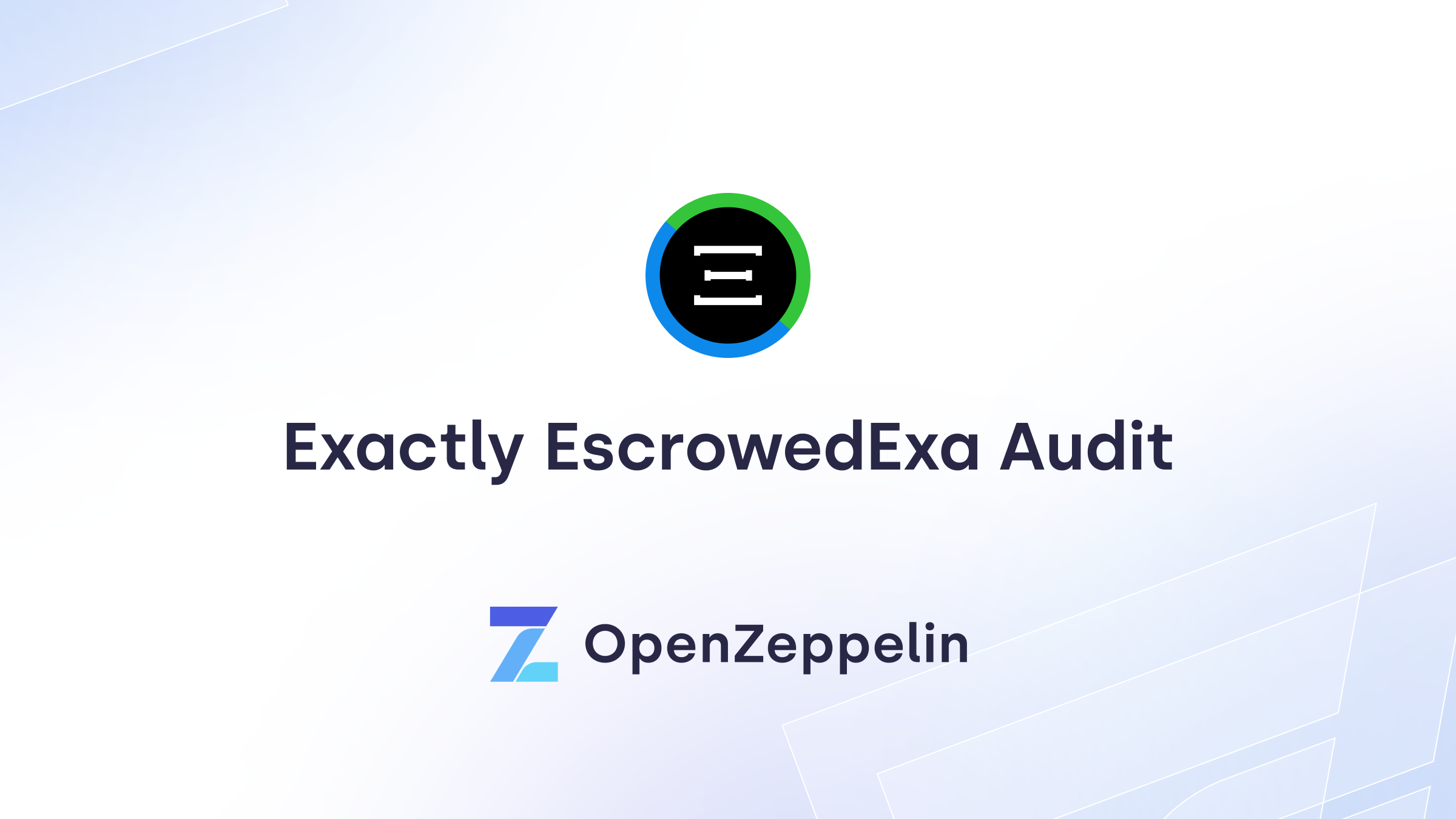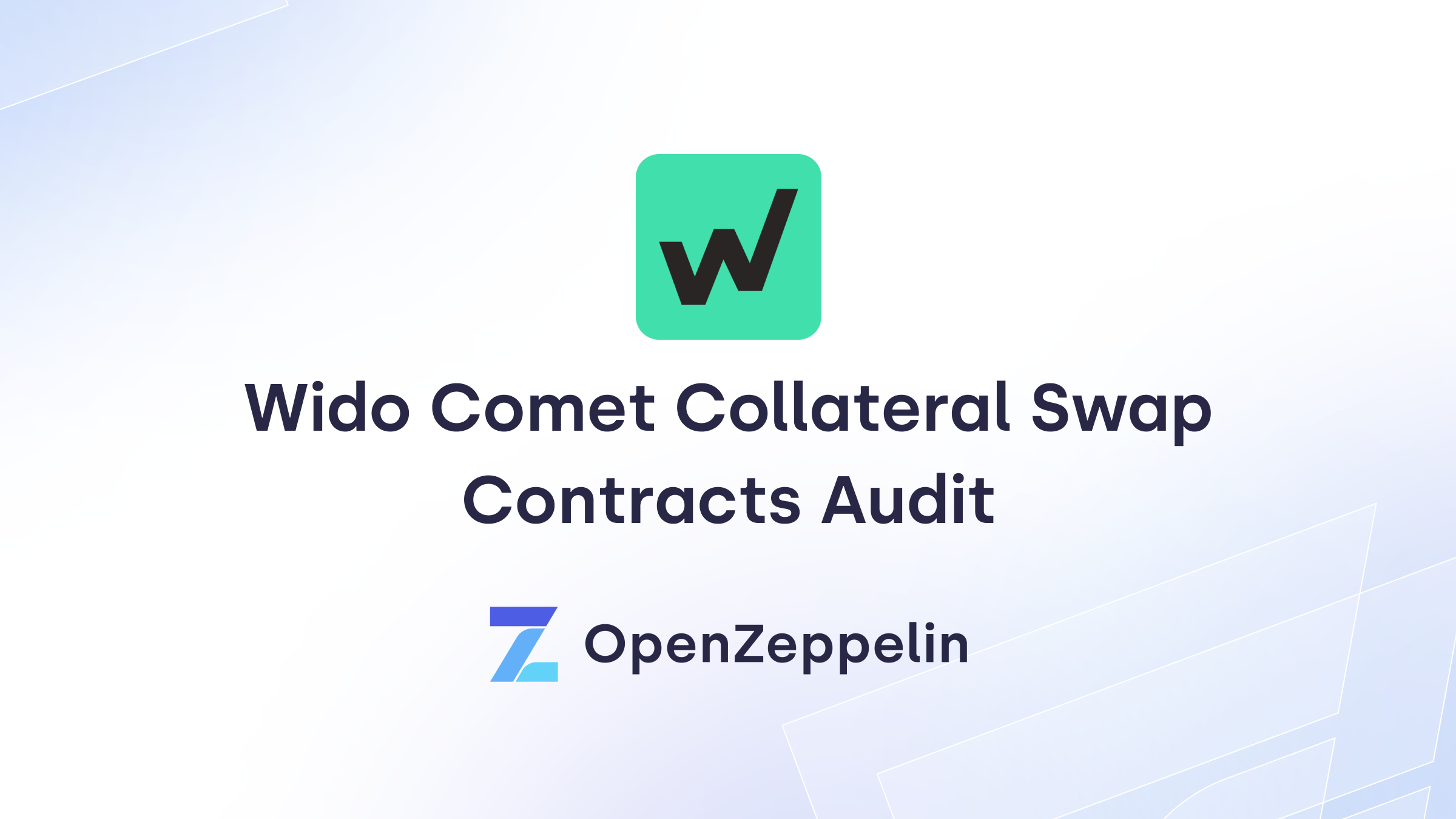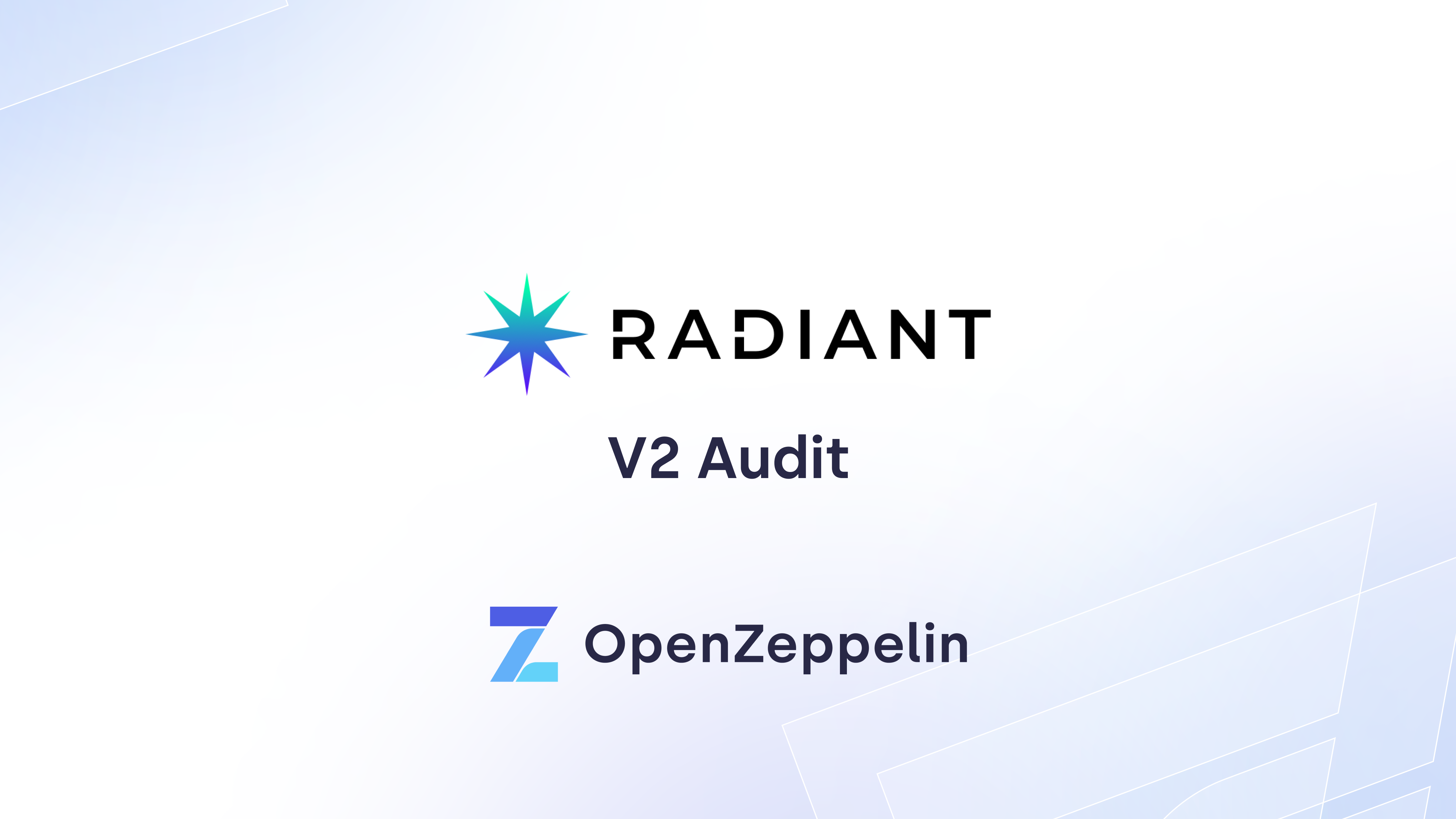August 28, 2023
This security assessment was prepared by OpenZeppelin.
Table of Contents
- Table of Contents
- Summary
- Scope
- System Overview
- Security Model and Trust Assumptions
- Privileged Roles
- Low Severity
- Notes & Additional Information
- Non-Explicit Imports
- Not Inheriting From Available Interfaces
- Unnecessary Inheritances
- Lack of SPDX License Identifiers
- Lack of Indexed Event Parameters
- Using int/uint Instead of int256/uint256
- Local Variable Shares Name With Storage Variable
- Constants Not Using UPPER_CASE Format
- Unnecessary Imports
- Inconsistent Coding Style
- Conclusions
Summary
- Type
- DeFi
- Timeline
- From 2023-07-07
- To 2023-07-28
- Languages
- Solidity
- Total Issues
- 16 (12 resolved, 1 partially resolved)
- Critical Severity Issues
- 0 (0 resolved)
- High Severity Issues
- 0 (0 resolved)
- Medium Severity Issues
- 0 (0 resolved)
- Low Severity Issues
- 6 (4 resolved)
- Notes & Additional Information
- 10 (8 resolved, 1 partially resolved)
Scope
We audited the venus-protocol repository at the 94bc2e414e33ebf6c05d35c1605dcbd48fa932f5 commit.
In scope were the following contracts:
contracts
├── Comptroller
├── ComptrollerStorage.sol
└── Diamond
├── Diamond.sol
├──facets
├──FacetBase.sol
├──MarketFacet.sol
├──PolicyFacet.sol
├──RewardFacet.sol
├──SetterFacet.sol
└──XVSRewardsHelper.sol
└── interfaces
├──IDiamondCut.sol
├──IMarketFacet.sol
├──IPolicyFacet.sol
├──IRewardFacet.sol
└──ISetterFacet.sol
System Overview
The Comptroller is the core smart contract system responsible for managing markets and risk within the Venus lending protocol. It serves as a central hub and reliable source of truth for lending markets, carrying out crucial security measures and health checks for positions. This report focuses on a recent Comptroller update that restructures the contract to follow the diamond pattern.
In this update, the Comptroller's implementation has been adapted to a diamond pattern that maintains a mapping holding all function selectors and their corresponding facets. This structure allows the Diamond to route all function calls to their corresponding facets through a delegate call. The original storage remains untouched in the Unitroller, with the only new additions being variables related to the diamond pattern.
The Comptroller's functionality has been divided into the following facets:
- The
FacetBase, which acts as a base containing all core internal functionalities used by all the other facets. - The
MarketFacet, which contains all the methods related to the market's management in the pool. - The
PolicyFacet, which oversees crucial security checks and risk management for positions. It houses functions consulted by markets to guarantee the health status of positions during key actions such as borrowing and liquidations. - The
RewardFacet, which takes charge of the computation and allocation of XVS rewards, ensuring their accurate distribution to qualifying addresses. - The
SetterFacet, which is mainly used by privileged roles to enable the modification of protocol configuration values. - The
XVSRewardsHelperfacet, which contains internal functions used inRewardFacetandPolicyFacet.
Security Model and Trust Assumptions
Venus users are placing ultimate trust in the Comptroller admin, who can change critical safety parameters. The admin is currently set to the Venus governance contract.
Privileged Roles
The admin address can call multiple permissioned methods and enable custom access control for certain functions. The admin or admin-chosen addresses can perform the following actions:
- Add function selectors to the
Diamond. - Change the comptroller's implementation.
- Change the admin.
- Set custom access control for certain functions.
- Add new lending markets.
- Set the XVS accrual speed for any market.
- Give XVS grants.
- Call all setters in the setter facet to modify critical parameters such as the collateral factor or the oracle address.
Low Severity
Potential Irreversibility in venusVAIVaultRate Adjustments
If the venusVAIVaultRate is mistakenly changed to a very high number in _setVenusVAIVaultRate(), releaseToVault() will overflow.
If there is an attempt to correct the venusVAIVaultRate, releaseToVault will revert due to overflow, impeding any further change to the venusVAIVaultRate.
Consider adding input checks to prevent overflows.
Update: Acknowledged, not resolved. The Venus team stated:
venusVAIVaultRateis set by the governance so the chances of setting it wrong are negligible. For now, we will just acknowledge the issue and no actions are needed from us.
Incorrect Function Signature in _setActionsPaused
The ensureAllowed check in the _setActionsPaused function verifies whether a certain user is allowed to call the function by checking the msg.sender and function signature in the AccessControlManager.
However, the signature is calculated incorrectly. To calculate the 4-byte signature for _setActionsPaused(address[] calldata markets_, Action[] calldata actions_, bool paused_), the canonical representation _setActionsPaused(address[],uint8[],bool) should be used instead of _setActionsPaused(address[],uint256[],bool). Actions is an enum, and in Solidity 0.5.16 enums are mapped to the smallest uint type that is large enough to hold all the values. Since Actions holds 9 values, it will be mapped to uint8.
The correct function signature for the _setActionsPaused function should be 0x2b5d790c.
In this case, since the canonical representation is used instead of the 4-byte signature when setting and checking the signature, the impact is relatively limited.
Update: Resolved in pull request #312 at commit cfaa69a.
Missing Docstrings
Although many functions in the codebase are well-documented and the code is generally self-explanatory, the codebase could benefit from more complete NatSpec comments for all public and external functions. For instance:
getAssetsInin MarketFacet.sol_setLiquidatorContractin SetterFacet.sol_setVAIMintRatein SetterFacet.sol_setTreasuryDatain SetterFacet.sol
Consider thoroughly documenting all functions (and their parameters) that are part of any contract's public API. Functions implementing sensitive functionality, even if not public, should be clearly documented as well.
Update: Resolved in pull request #312 at commit 3909ff7.
Implementation of EIP-2535 Does Not Fully Match the Specification
The Diamond contract implements the EIP-2535 standard, often referred to as the diamond proxy pattern.
The diamond proxy pattern is a proxy design where the functions are separated into multiple smaller 'facet' contracts. By breaking down the implementation contract into multiple facets, it is possible to build larger and more complex applications without exceeding the contract size limit.
However, there are some mismatches between the current implementation and the official specification worth highlighting:
- The diamondCut(IDiamondCut.FacetCut[] memory _diamondCut) function should be
diamondCut(IDiamondCut.FacetCut[] memory _diamondCut, address _init, bytes calldata _calldata). - The
getFacetFunctionSelectorsfunction should befacetFunctionSelectors. - The
getAllFacetAddressesfunction should befacetAddresses. - The
Diamondcontract does not implement thefacetsfunction. - The
Diamondcontract does not implement thefacetAddressfunction. - The
DiamondCut(IDiamondCut.FacetCut[] _diamondCut)event should beDiamondCut(FacetCut[] _diamondCut, address _init, bytes _calldata);.
While the deviations from the specification may not be problematic for this particular use case, they may potentially cause errors in clients interacting with the Diamond contract who expect a fully-compliant implementation of EIP-2535. For example, tools such as Louper will not work as the function signatures of the functions used to inspect the Diamond do not match the ones from the standard.
Therefore, it is advisable to either modify the contract to make it fully compliant or clearly document the expected differences between the Diamond contract and the EIP.
Update: Resolved in pull request #312 at commit 7417d8f.
Possible Function Selector Clashing
Clashing can happen among functions with different names. Every function that is part of a contract’s public ABI is identified, at the bytecode level, by a 4-byte identifier. This identifier depends on the function's signature, but since it is only 4 bytes, there is a possibility that two different functions with different function signatures may end up having the same identifier. The Solidity compiler tracks when this happens within the same contract, but not when the collision happens across different ones, such as between a proxy and its logic contract.
In this protocol, the Unitroller contract delegatecalls the Diamond contract which delegatecalls the facets. The Unitroller contract contains 8 public/external functions and the Diamond contract contains 46 public/external functions (this can increase in future upgrades).
The presence of these functions creates the possibility of a function selector clash. This can happen in the following scenarios:
- Functions in
Unitrollerand hardcoded functions inDiamondwith the same function selector - Functions in
Unitrollerand a facet with the same function selector - Hardcoded functions in
Diamondand a facet with the same function selector
Note that functions between different facets cannot clash as the diamondCut function prevents adding new functions whose signature is already registered in the Diamond.
Consider checking that no function selector collision is present when adding new functions to the Diamond (using diamondCut) or upgrading the Diamond's implementation. Moving the hardcoded functions in Diamond.sol to a facet will also reduce the chances of a collision going unnoticed.
Update: Acknowledged, not resolved. The Venus team stated:
We have just included the
diamondCutfunctionality in theDiamond.solfile. For now, we will just acknowledge the issue, and no actions are needed from us.
Unnecessary Access Allowance to the Comptroller Implementation
The security check ensureAdminOr(comptrollerImplementation) in _setVenusSpeeds and _grantXVS allows msg.sender to be the admin or the comptrollerImplementation. There is no reason to allow for msg.sender == comptrollerImplementation since the facets are called by the Diamond contract through delegateCall.
Allowing access from the comptrollerImplementation opens a potential attack path if the implementation were able to do calls to the Unitroller.
Consider disallowing access to these functions from the ComtprollerImplementation.
Update: Resolved in pull request #312 at commit 0aa7e17.
Notes & Additional Information
Non-Explicit Imports
The use of non-explicit imports in the codebase can decrease the clarity of the code and may create naming conflicts between locally defined and imported variables. This is particularly relevant when multiple contracts exist within the same Solidity files or when inheritance chains are long.
Throughout the codebase, global imports are being used. Some instances are (but not limited to):
- Line 3 of
ComptrollerStorage.sol - Line 4 of
ComptrollerStorage.sol - Line 5 of
ComptrollerStorage.sol - Line 7 of
FacetBase.sol - Line 8 of
FacetBase.sol - Line 3 of
MarketFacet.sol - Line 4 of
MarketFacet.sol - Line 3 of
PolicyFacet.sol
Following the principle that clearer code is better code, consider using named import syntax (import {A, B, C} from "X") to explicitly declare which contracts are being imported.
Update: Resolved in pull request #312 at commit 6d0a33c.
Not Inheriting From Available Interfaces
The Diamond has multiple facets, and each facet has its own interface. However, the facet contracts are not explicitly inheriting their interfaces. This can lead to issues if an interface or corresponding contract is modified in a way that would make them incompatible.
Additionally, functions are added to the Diamond by calculating the function signatures from the interfaces instead of the contracts. Therefore it is important that the facet contracts explicitly inherit their respective interfaces to ensure the correct functions are added to the Diamond. For instance:
Diamonddoes not inherit fromIDiamondCutMarketFacetdoes not inherit fromIMarketFacetPolicyFacetdoes not inherit fromIPolicyFacetRewardFacetdoes not inherit fromIRewardFacetSetterFacetdoes not inherit fromISetterFacet
To clarify intent, increase the readability of the codebase, and allow the compiler to perform more robust error-checking, consider updating the contracts' inheritance declarations to explicitly inherit from their corresponding interfaces.
Update: Resolved in pull request #312 at commit 50761a0.
Unnecessary Inheritances
The codebase contains two instances of unnecessary inheritances:
MarketFacetinheritsExponentialNoError. However,FacetBasealready inheritsExponentialNoError. Consider removing the explicit inheritance ofExponentialNoErrorinMarketFacet.SetterFacetinheritsExponentialNoError. However,FacetBasealready inheritsExponentialNoError. Consider removing the explicit inheritance ofExponentialNoErrorinSetterFacet.
Inheriting a contract multiple times can be confusing and may lead to inconsistencies if the inherited contract is consuming storage slots. While the current version of ExponentialNoError is not consuming any storage slots, consider removing the duplicate inheritance to improve readability.
Update: Resolved in pull request #312 at commit 4c72e43.
Lack of SPDX License Identifiers
Throughout the codebase, there are files that lack SPDX license identifiers. For instance:
ComptrollerStorage.solDiamond.solFacetBase.solMarketFacet.solPolicyFacet.solRewardFacet.solSetterFacet.solXVSRewardsHelper.solIDiamondCut.solIMarketFacet.solIPolicyFacet.solIRewardFacet.solISetterFacet.sol
To avoid legal issues regarding copyright and follow best practices, consider adding SPDX license identifiers to files as suggested by the Solidity documentation.
Update: Resolved in pull request #312 at commit 0387b34.
Lack of Indexed Event Parameters
Throughout the codebase, several events do not have their parameters indexed. For instance:
- Line 12 and line 15 of
FacetBase.sol - Line 11, line 14, and line 17 of
MarketFacet.sol - Line 11 of
RewardFacet.sol - All events in
SetterFacet.sol
Consider indexing event parameters to improve the ability of off-chain services to search and filter for specific events.
Update: Resolved in pull request #312 at commit 5533343.
Using int/uint Instead of int256/uint256
In the following contracts, there are instances where int/uint are used instead of int256/uint256:
ComptrollerStorage.solFacetBase.solMarketFacet.solPolicyFacet.solSetterFacet.solIPolicyFacet.solISetterFacet.sol
In favor of explicitness, consider replacing all instances of int/uint with int256/uint256.
Update: Resolved in pull request #312 at commit 5533343.
Local Variable Shares Name With Storage Variable
venusAccrued is declared as a local variable, but there is a storage variable with the same name.
Consider using different names to improve the codebase's readability.
Update: Resolved in pull request #312 at commit 4596c2b.
Constants Not Using UPPER_CASE Format
In FacetBase.sol, there are several constants that are not using UPPER_CASE format. For instance:
- The
venusInitialIndexconstant declared on line 20 - The
closeFactorMinMantissaconstant declared on line 22 - The
closeFactorMaxMantissaconstant declared on line 24 - The
collateralFactorMaxMantissaconstant declared on line 26
According to the Solidity Style Guide, constants should be named with all capital letters with underscores separating words. For better readability, consider following this convention.
Update: Acknowledged, not resolved. The Venus team stated:
As we have dependencies on external contracts, if we change the convention the public variable
venusInitialIndexand its getter will be changed. So for now we can't do the suggested change and will acknowledge the issue.
Unnecessary Imports
Throughout the codebase, there are multiple instances of unnecessary imports that are either unused or already imported by other files.
- Import
ComptrollerStorageofDiamond.solwhich is already imported byUnitroller - Import
ErrorReporterofFacetBase.solwhich is already imported byVToken - Import
ErrorReporterofPolicyFacet.solwhich is already imported byVToken - Import
ErrorReporterofSetterFacet.solwhich is already imported byFacetBase - Import
PriceOracleofIMarketFacet.sol - Import
PriceOracleofIRewardFacet.sol
Consider removing unused imports to improve the overall clarity and readability of the codebase.
Update: Resolved in pull request #312 at commit 6d0a33c.
Inconsistent Coding Style
There are general inconsistencies and deviations from the Solidity Style Guide throughout the codebase. Below is a non-exhaustive list of inconsistent coding styles.
While most external function names do not contain an underscore, some begin with one underscore. For example:
Some functions use named return variables, while others do not. For example:
getFacetFunctionSelectorsandgetAllFacetAddressesdeclare named variables for the returned values.- All the other functions in
Diamond.soldo not declare a named variable for the return values.
Some facets are importing the ComptrollerErrorReporter contract while other facets are inheriting the ComptrollerErrorReporter contract. For example:
- FacetBase is importing the
ComptrollerErrorReportercontract and therefore usesComptrollerErrorReporter.Error. - MarketFacet is inheriting the
ComptrollerErrorReportercontract and therefore usesError.
Consider enforcing a standard coding style, such as the one provided by the Solidity Style Guide, to improve the project's overall readability and consistency. Also, consider using a linter such as Solhint to define a style and analyze the codebase for style deviations.
Update: Partially resolved in pull request #312 at commit 4c72e43. The Venus team stated:
We have not removed
_from external methods as they are setters for the state variables and governance-controlled.
Conclusions
The Diamond update refines the contract's structure and upgradeability mechanism, with negligible impact on function operations or underlying logic. This audit yielded 6 low-severity issues and 10 code quality notes.


